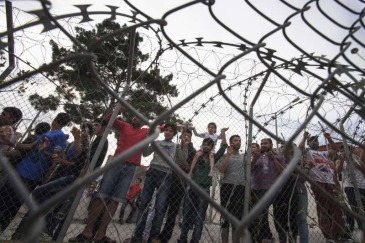The bodies of a further 25 people had been recovered, but dozens more were still missing and feared dead after the flimsy, overcrowded fishing vessel sank minutes after it left shore, according to the UN High Commissioner for Refugees (UNHCR).*
“Another terrible tragedy happened on the Mediterranean 15 miles off the coast of Libya, so obviously the boat was just setting off. Refugees and migrants do not deserve to die seeking a better life,” UNHCR spokesperson Melissa Fleming stated.
Before this tragedy, which took place on 5 August, some 2,100 people had died so far this year trying to cross the Mediterranean to reach Europe.
Survivors described how the boat was packed and that people panicked when they saw a rescue boat approaching, rushing to one side and tipping the vessel over, Ms. Fleming said.
“These are boats which should only have 40-50 people on board and not 600. People were stuffed into the haul, shoulder to shoulder, feet to feet in every possible nook and cranny.”
According to people on the rescue boat, there were bodies, life jackets and debris in the water. Rescuers did what they could to save panicked and frightened people.
“No one should have to die reaching safety in Europe,” said Ms. Fleming. “The vast majority of people arriving to Europe across the Mediterranean – and there have been 200,000 this year – are people that are fleeing war and conflict and persecution.”
She blamed “ruthless and money-hungry” smugglers for packing such large numbers of people on unsuitable vessels, calling for greater funding to help address the crisis and stem the flow of “desperate” people.
“Unfortunately, we have a system where refugees in neighbouring countries they first fled to are not being assisted to the level we would like to see them assisted. This drives them to say, ‘I can’t make it here and we are going to go to Europe,’” she explained. (*Source: UN).
Fleeing conflicts, record numbers of migrants and refugees crossed Mediterranean so far in 2015

Afghan refugees leave their dinghy and wade ashore in Mytilini, on the Greek island of Lesvos. UNHCR/Jowan Akkash
War, conflict or persecution forced most of the 137,000 desperate people who made the perilous journey to cross the Mediterranean Sea into Europe during the first six months of 2015, making this primarily a refugee crisis, a new report from the United Nations refugee agency on 1 July 2015 said.**
The opening lines of the The sea route to Europe: The Mediterranean passage in the age of refugees, compiled by the Office of the UN High Commissioner for Refugees, put the challenges facing Europe, the wider international community and humanitarian actors in stark relief.
“Europe is living through a maritime refugee crisis of historic proportions. Its evolving response has become one of the continent’s defining challenges of the early 21st century, with long-lasting implications for humanitarian practice, regional stability and international public opinion,” it says, also revealing that the first half of the year saw an increase of 83 per cent of such crossings compared to the same period last year.
“As Europe debates the best way to deal with the rising crisis on the Mediterranean, we must be clear: most of the people arriving by sea in Europe are refugees, seeking protection from war and persecution,” said UN High Commissioner for Refugees António Guterres in a press release on the launch of the report.
One third of the men, women and children who arrived by sea in Italy or Greece were from Syria, whose nationals are almost universally deemed to qualify for refugee status or other forms of protection, the report explains. The second and third most common countries of origin are Afghanistan and Eritrea, whose nationals are also mostly considered to qualify for refugee status.

Asylum-seekers in a holding centre on Greece’s Samos Island. Photo: UNHCR/A. D’Amato
“Data received from Greece, Italy, Malta and Spain charts an 83 per cent increase in refugees and migrants crossing the Mediterranean from January to June compared to the same period last year. Historically, crossings significantly increase in the second half of the year, in particular over the summer months, so it is expected the numbers will continue to soar. Arrivals in the second half of 2014, for example, were almost double those of the first half,” warns Gutteres.
The number of deaths at sea rose to record levels in April 2015, and then dropped dramatically in May and June. Between January and March, 479 refugees and migrants drowned or went missing, as opposed to 15 during the first three months of the year before. In April the situation took an even more terrible turn.
In a number of concurrent wrecks, an unprecedented 1,308 refugees and migrants drowned or went missing in a single month, the report emphasizes.
“The decline in people drowning over the past two months [May and June] is encouraging; a sign that with the right policy, backed by an effective operational response, it is possible to save more lives at sea,” acknowledged Guterres.
“Nonetheless, we must stay vigilant. For the thousands of refugees and migrants who continue to cross the Mediterranean every week, the risks remain very real.” The report shows that the eastern Mediterranean route from Turkey into Greece has now surpassed the central Mediterranean route (from North Africa to Italy) as the main source of maritime arrivals.
“Europe has a clear responsibility to help those seeking protection from war and persecution,” said Guterres. “To deny that responsibility is to threaten the very building blocks of the humanitarian system Europe worked so hard to build. European countries must shoulder their fair share in responding to the refugee crisis, at home and abroad”, said Gutteres. (**Source: UN).
Read also:







